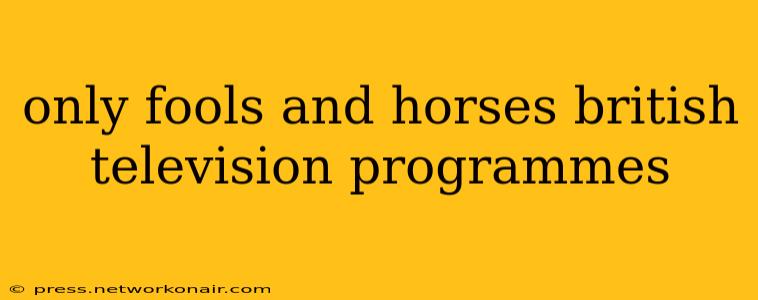Only Fools and Horses, a British sitcom that ran from 1981 to 1991, remains a cultural icon, beloved by generations and a testament to the enduring power of British comedy. Its enduring popularity stems from a winning combination of witty writing, memorable characters, and a heartwarming portrayal of working-class life in Peckham, South London. This exploration dives deep into the show's success, exploring its key elements and answering some frequently asked questions.
What Makes Only Fools and Horses So Popular?
The show's enduring appeal lies in its relatable characters and sharp, often satirical, social commentary. Del Boy Trotter, the self-proclaimed wheeler-dealer, is a flawed but ultimately lovable rogue. His relentless optimism, despite constant setbacks, is both comedic and strangely endearing. His younger brother Rodney, the perpetually unlucky foil, provides a perfect counterpoint, their dynamic forming the comedic heart of the show. The supporting cast, including Uncle Albert, Boycie, and Marlene, are equally well-developed and memorable, adding layers of complexity and humor to the narrative.
The writing is another key element. The scripts are brilliantly crafted, filled with memorable catchphrases ("Lovely jubbly!", "This time next year, Rodders… we’ll be millionaires!"), witty dialogue, and a clever blend of slapstick and situational comedy. The show's writers expertly navigated the line between broad farce and nuanced character development, creating a show that could be enjoyed by audiences of all ages and backgrounds.
Furthermore, Only Fools and Horses cleverly captured a specific time and place in British history, reflecting the social and economic changes of the 1980s. While depicting the struggles of working-class life, it also celebrated the resilience and humor found within those communities. This resonated deeply with viewers, fostering a sense of nostalgia and shared experience that continues to resonate today.
What are the Main Characters in Only Fools and Horses?
-
Del Boy Trotter: The ambitious but inept older brother, constantly scheming for quick riches. His flawed plans and comedic mishaps are a central feature of the show.
-
Rodney Trotter: Del's younger brother, often the victim of Del's schemes, but also capable of his own brand of mischief. He represents a more grounded and realistic perspective, contrasting Del's outlandish ambitions.
-
Uncle Albert: Del and Rodney's eccentric uncle, a World War I veteran with a penchant for tall tales and a forgetful nature. He's a source of constant amusement and unintentional chaos.
-
Boycie: A rival businessman and frequent antagonist, known for his miserly nature and pompous demeanor. His interactions with Del Boy are a highlight of the show's comedic tension.
-
Marlene: Boycie's equally materialistic and sharp-tongued wife. She provides a strong female presence and often engages in witty banter with Del Boy.
How Many Series of Only Fools and Horses are There?
Only Fools and Horses ran for a total of eleven series, with several Christmas specials adding to its extensive run. These episodes became highly anticipated annual events, further cementing the show's place in British culture.
Where Was Only Fools and Horses Filmed?
Much of the exterior filming took place in Peckham, South London, lending the show a strong sense of place and realism. Interior scenes were predominantly filmed at various studios.
Why is Only Fools and Horses Still Popular Today?
Its timeless appeal stems from a perfect storm of factors. The characters are relatable despite their eccentricities. The humor is both slapstick and subtle, appealing to a wide range of viewers. The show's nostalgic portrayal of a specific era in British history connects with audiences on an emotional level. Finally, the enduring quality of the writing ensures its continued relevance and enjoyment for new generations of viewers. Only Fools and Horses remains a cherished piece of British television history, a testament to the enduring power of well-crafted comedy.

